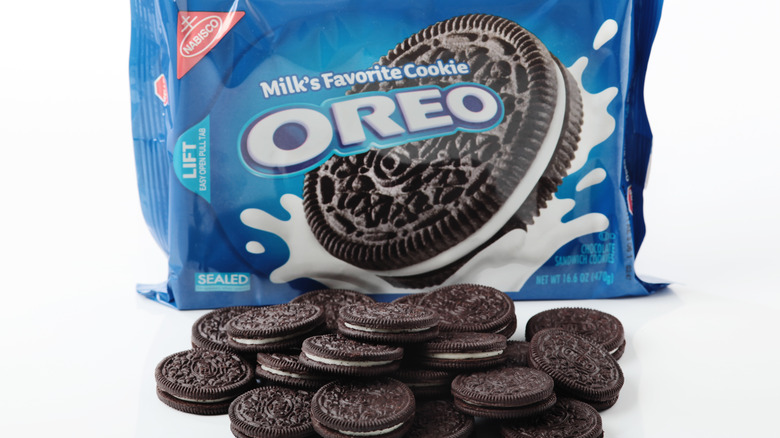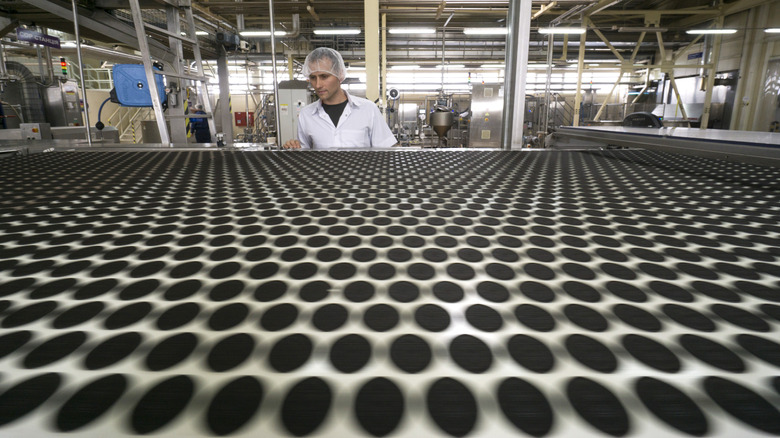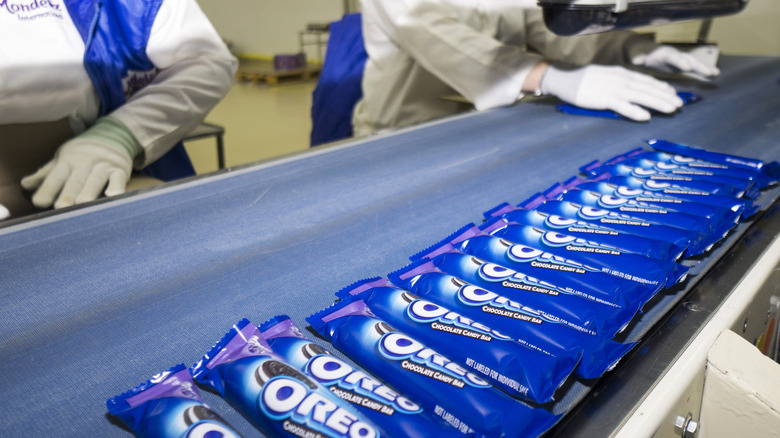Why Oreo Creme Isn't Considered Vegan By The Manufacturers
Oreos have often been held up as a vegan-friendly snack food: Although they might have a "cream" filling, there are no animal products to be found in these cookies. In fact, the filling is officially described as "creme" precisely because it doesn't contain dairy — so, for Oreos to stick to U.S. Food and Drug Administration rules, the word "cream" (which would imply dairy ingredients) can't be used.
Yet there's a small catch: While some vegans are generally content to eat Oreos, their manufacturer Nabisco suggests that the cookies may not be absolutely, strictly dairy-free. The company's official statement is that "Many Oreo products are suitable for vegans but may include cross-contaminants of milk." While Nabisco doesn't go into great detail about this, this likely means that Oreos are produced on factory equipment that also handles dairy products like milk (perhaps for the production of a different cookie), so there's a chance that Oreos could be exposed to a dairy product during production, even if it's not actually one of the ingredients. This means that in the strictest possible terms, the company can't absolutely, positively guarantee that the product is perfectly dairy-free and doesn't promote them this way (although any dairy that does get in would likely be a tiny, trace amount).
Exactly how non-vegan are Oreos, then?
Even if Nabisco won't absolutely guarantee that Oreos are perfectly vegan, many vegans will generally say that Oreos are fine to eat, and they do appear on official lists of vegan products. The ingredients for classic Oreos include things like sugar, flour, canola oil, salt, corn syrup, and cornstarch — and while they might be highly processed, none of the ingredients come from animals. Many vegans will then consider them fine to eat, on the basis that there's no dairy in the actual ingredients list (the argument goes that Nabisco makes a cross-contamination warning just to cover itself legally, not because there's actually much chance of dairy getting into Oreos).
That said, there's some debate among vegans, and if you're on a very strict vegan diet, you may want to avoid them. Similarly, if you have a dairy allergy and even a trace amount could cause a harmful reaction, you also might want to play it safe and avoid Oreos. If you're lactose intolerant, it's likely okay — because lactose intolerant individuals can typically handle small amounts of dairy (per the Better Health Channel).
But watch out for the other types of Oreos
Bear in mind that this information applies to your regular, classic Oreos — but there have been dozens of different varieties of Oreos on the market, and some of the other flavors are not quite so dairy-free and vegan-friendly. As a general rule, any fudge-covered Oreos are not vegan, as the fudge coating contains dairy. The same goes for Oreo Cakesters, which include dairy ingredients in their batter.
But quite a few Oreo varieties are considered vegan friendly: These include Golden Oreos, and flavors like lemon, mint, birthday cake, and cinnamon. Double Stuf Oreos are also considered vegan-friendly (since they just contain more "creme" filling, with otherwise the same ingredients). This list is non-exhaustive, so if you're eyeing a new flavor of Oreo, check the ingredients on the packaging before you buy to see if it's vegan-friendly; some news sites for vegans also keep track of which products are and are not okay for vegans, so also look there before you chow down.


